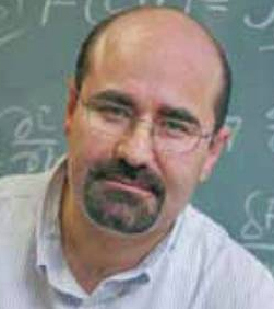Microstructural Stability in Irradiated Materials
| Event Date: | September 8, 2010 |
|---|---|
| Speaker: | Anter A. El-Azab, Ph.D. Professor Department of Scientific Computing Material Science Graduate Program |
| Speaker Affiliation: | Mechanical Engineering Department Florida State University |
| Type: | Joint Seminar |
| Time: | 3:30 p.m. |
| Location: | ECE 170 |
Abstract:
In a reactor environment, intense particle irradiation induces microchemical and microstructural evolution and phase changes in fuel and structural materials. Such lattice-level material changes are strongly influenced by the operating temperature and stress conditions, and they result in severe dimensional changes and mechanical and thermal property degradation. Over the past several decades, researchers have gathered large databases on various aspects of radiation effects in materials, and developed a wide range of models to describe the mechanisms and microstructure processes leading to the observed macroscopic radiation effects. Although these efforts have advanced our knowledge about materials in irradiation environments, a unified view of how to describe radiation effects in materials is still largely missing. In this presentation, I will highlight a field theoretic approach to modeling and understanding the microstructural changes that occur in materials as a result of irradiation. This approach is based on the concurrent defect dynamics and microstructure and microchemical evolution (including phase changes) in irradiated materials. Specific attention will be given to the mesoscale, where a systematic derivation of a phase field model from the principles of non-equilibrium thermodynamics will be shown and demonstrated for void and gas bubble nucleation and growth and microchemical evolution in alloys. The physical, mathematical, and computational aspects of the phase field modeling framework for irradiated materials will be discussed.
Brief Bio:
Anter El-Azab is a Professor of Computational Materials Science at Florida State University. His research interests are in the field of theoretical and computational modeling of defects in materials. His current research areas include microstructure and microchemical evolution in irradiated alloys and ceramics, morphological instabilities in heterogeneous and nanoscale materials, dislocation dynamics and mesoscale deformation of metals, thermal transport in materials, and reduced order models in materials modeling. He worked for six years as a senior scientist at Pacific Northwest National Laboratory; there he joined the computational mechanics, applied mathematics, and the interfacial and nanoscience groups. He joined Florida State University in the fall of 2004 as an Associate Professor of Mechanical Engineering then transitioned to a joint position with the former School of Computational Science and Mechanical Engineering department two years later. Currently, he is a full professor with the Department of Scientific Computing and is a faculty member of Florida State’s graduate program in Materials Science.
Anter obtained his Ph.D. degree in Nuclear Engineering in 1994 at the University of California, Los Angeles, and his B.S. and M.S. degrees also in Nuclear Engineering at the University of Alexandria, Egypt.
2010-09-08 15:30:00 2010-09-08 16:30:00 America/Indiana/Indianapolis Microstructural Stability in Irradiated Materials ECE 170

